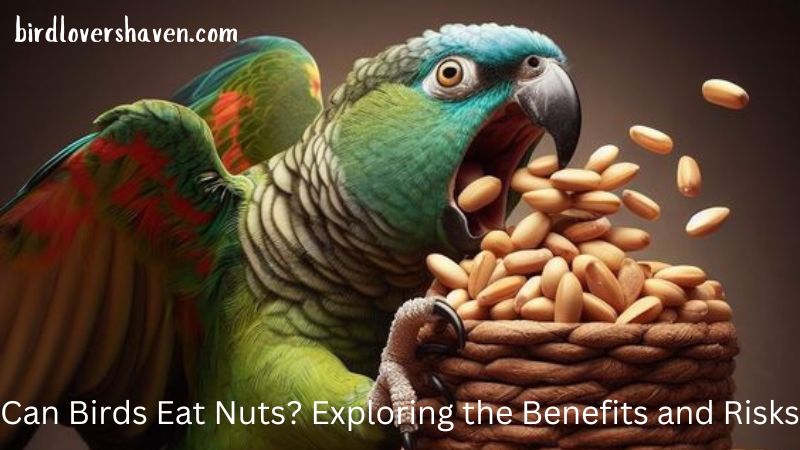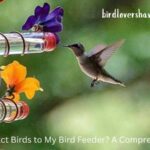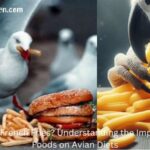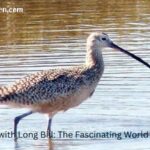Bird enthusiasts often wonder about the best foods to provide for their feathered friends, aiming to offer a diet that is both nutritious and appealing. Among the many options, nuts stand out as a popular choice due to their high energy content and availability. But can birds eat nuts?
This article, birdlovershaven.com explores the various aspects of feeding nuts to birds, including the nutritional benefits, potential risks, suitable types of nuts, and how to incorporate them into a bird’s diet.
Table of contents
ToggleNutritional Benefits of Nuts for Birds
Nuts are a rich source of essential nutrients that can significantly benefit birds. Here’s a breakdown of the key nutritional components found in nuts and their importance for avian health:
1. High in Protein
Nuts are an excellent source of protein, which plays a crucial role in birds’ muscle development and overall health. Protein is especially vital during the breeding season, when birds are raising their young and require additional nutrients to support growth and development. For young birds, protein is essential for building strong muscles and tissues, ensuring they develop into healthy adults. For adult birds, protein helps maintain muscle mass and supports various bodily functions, including enzyme production and immune system responses.
2. Rich in Healthy Fats
The fats found in nuts are primarily unsaturated, making them a valuable source of energy for birds. Fats are particularly important during colder months when birds need to maintain their body heat to survive harsh weather conditions. Unlike saturated fats, which can be harder for birds to metabolize, unsaturated fats are easier to digest and provide a steady energy supply. Additionally, fats play a crucial role in maintaining healthy feathers and skin. Well-nourished feathers are essential for insulation, flight, and waterproofing, while healthy skin supports overall well-being and resilience to environmental stressors.
3. Vitamins and Minerals
Nuts are packed with essential vitamins and minerals that contribute to overall bird health. Among these, vitamin E stands out for its role in supporting immune function and acting as an antioxidant, protecting cells from damage caused by free radicals. Magnesium is another important mineral found in nuts, playing a key role in muscle function, nerve transmission, and bone health. Potassium, also present in nuts, helps regulate fluid balance, muscle contractions, and nerve signals, contributing to cardiovascular health. Together, these vitamins and minerals support a wide range of physiological processes, ensuring that birds remain healthy and vibrant.
4. Antioxidants
Many nuts, particularly those with darker skins like walnuts and pecans, are rich in antioxidants. These compounds help protect birds from oxidative stress, which can be caused by environmental factors such as pollution, UV radiation, and exposure to toxins. Oxidative stress occurs when there is an imbalance between free radicals and antioxidants in the body, leading to cell damage and contributing to aging and various diseases. Antioxidants in nuts neutralize free radicals, reducing the risk of oxidative damage and supporting overall longevity and health. For birds, this means a stronger immune system, better resistance to disease, and improved overall vitality.
Suitable Types of Nuts for Birds
Not all nuts are created equal when it comes to feeding birds. Some are more suitable than others, and certain types of nuts should be avoided altogether. Below is a list of nuts that are safe and beneficial for birds:
- Peanuts: Perhaps the most popular nut for feeding birds, peanuts are a favorite among many species, including woodpeckers, blue jays, and chickadees. Peanuts are high in protein and fat, making them an excellent energy source. However, it’s important to offer unsalted, raw, or dry-roasted peanuts without any added oils or flavorings.
- Almonds: Almonds are another great option for birds. They are high in protein, healthy fats, and vitamin E. Almonds should be offered unsalted and unseasoned. Birds like woodpeckers and titmice are particularly fond of almonds.
- Walnuts: Walnuts are rich in omega-3 fatty acids, which are beneficial for birds’ cardiovascular health. They are also high in antioxidants. Walnuts can be fed to birds whole, in halves, or chopped. Larger birds like crows and jays can handle whole walnuts, while smaller birds may prefer them in smaller pieces.
- Pecans: Pecans are similar to walnuts in terms of nutritional benefits and can be offered in a similar manner. They are a good source of energy and are particularly attractive to jays and woodpeckers.
- Hazelnuts: Hazelnuts are high in protein and fat and are a favorite of woodpeckers and chickadees. Like other nuts, they should be offered unsalted and unseasoned.
- Pistachios: Pistachios, when offered unsalted and shelled, can be a nutritious treat for birds. They are high in protein and healthy fats. Birds like parrots and jays may particularly enjoy pistachios.
- Cashews: Cashews are rich in protein and healthy fats, but they should be offered in moderation due to their higher oxalate content, which can interfere with calcium absorption. Always offer unsalted, raw cashews.
- Pine Nuts: Pine nuts, though technically seeds, are often categorized with nuts and are highly nutritious. They are rich in protein and fat, making them a good energy source for birds. Pine nuts are particularly favored by small birds like nuthatches and chickadees.
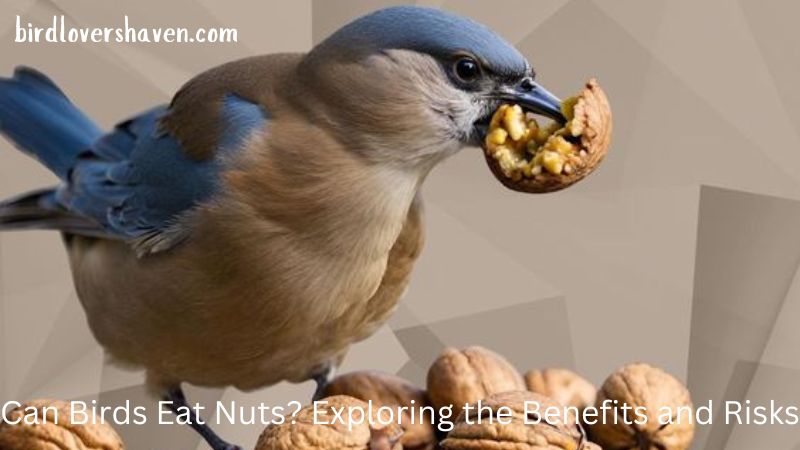
Potential Risks of Feeding Nuts to Birds
While nuts offer numerous benefits, there are potential risks to be aware of when feeding them to birds:
- Aflatoxins: Aflatoxins are toxic compounds produced by certain molds that can grow on nuts, particularly peanuts. These toxins are highly dangerous to birds and can cause liver damage or death if consumed in large amounts. To minimize the risk, always inspect nuts for mold and purchase them from reputable sources that store them properly.
- Overconsumption: Nuts are calorie-dense, and while they provide valuable energy, overfeeding can lead to obesity in birds. Obese birds may struggle with mobility and are at greater risk of health problems. It’s important to offer nuts in moderation as part of a balanced diet.
- Choking Hazard: Large nuts or nut pieces can pose a choking hazard to smaller birds. Always ensure that the nuts you offer are appropriately sized for the birds in your area.
- Competition and Aggression: Nuts are a high-value food item for many birds, which can lead to increased competition and aggression at feeding stations. Providing multiple feeding areas or using feeders designed for specific species can help reduce conflict.
- Nutritional Imbalance: While nuts are nutritious, they should not be the sole component of a bird’s diet. Birds need a variety of foods, including seeds, fruits, and insects, to meet their nutritional needs. Nuts should be offered as a supplement, not a replacement for other foods.
Incorporating Nuts into a Bird’s Diet
To safely incorporate nuts into a bird’s diet, follow these guidelines:
- Portion Control: Offer nuts in small quantities as part of a varied diet. For wild birds, a handful of nuts mixed with seeds and other foods can provide a balanced meal. For pet birds, nuts can be given as occasional treats.
- Preparation: Ensure nuts are unsalted and free from any harmful additives. For smaller birds, chop nuts into manageable pieces to prevent choking. Peanuts should be roasted to eliminate potential toxins.
- Feeding Methods: Nuts can be offered in various ways, such as in bird feeders, scattered on the ground, or hidden in foraging toys for pet birds. This encourages natural feeding behaviors and provides mental stimulation.
- Storage: Store nuts in a cool, dry place to prevent mold growth and contamination. Using airtight containers can help maintain their freshness.
Observing Bird Health and Behavior
As with any dietary change, it’s important to monitor birds for any signs of adverse reactions when introducing nuts. Look for changes in behavior, droppings, or overall health. If you notice any negative effects, discontinue feeding nuts and consult with a veterinarian or avian expert.
How to Safely Prepare and Offer Nuts to Birds
While nuts can be a healthy treat for birds, it’s important to prepare and offer them in a way that maximizes their benefits and minimizes any potential risks. Here are some tips for feeding nuts to birds:
- Avoid Salted or Flavored Nuts: Salt and artificial flavorings can be harmful to birds. Always choose unsalted, unseasoned nuts to ensure that you’re not introducing any harmful substances into a bird’s diet.
- Offer Raw or Dry-Roasted Nuts: Raw nuts are preferable, but dry-roasted nuts without added oils are also acceptable. Avoid nuts that have been roasted in oils, as these can introduce unhealthy fats into the bird’s diet.
- Chop or Crush Larger Nuts: While larger birds can handle whole nuts, smaller birds may struggle with them. Chopping or crushing nuts into smaller pieces can make them more accessible to a wider variety of bird species.
- Remove Shells: Some nuts, like peanuts and pistachios, can be offered shelled to birds that can crack them open, but removing the shells makes it easier for birds to eat the nuts and reduces the risk of choking or impaction.
- Limit Quantity: While nuts are nutritious, they are also calorie-dense. Offering nuts in moderation ensures that birds don’t overconsume them, which could lead to obesity or other health issues. A small handful of nuts scattered around a feeding area or mixed into other bird feed is usually sufficient.
- Use Nut Feeders: Specialized nut feeders are designed to hold nuts securely and allow birds to extract them piece by piece. These feeders can help reduce waste and prevent larger, more aggressive birds from monopolizing the food supply.
- Store Nuts Properly: Nuts can spoil if not stored correctly, especially in warm or humid environments. Store nuts in a cool, dry place and check them regularly for signs of mold or rancidity before offering them to birds.
DIY Nut Treats for Birds
If you enjoy preparing homemade treats for your feathered friends, consider making a nutritious nut mix or nut-based suet. Here’s a simple recipe for a bird-friendly nut mix:
Bird-Friendly Nut Mix Recipe
Ingredients:
- 1 cup of unsalted almonds (chopped)
- 1 cup of unsalted walnuts (chopped)
- 1 cup of unsalted peanuts (roasted and chopped)
- 1/2 cup of unsalted pecans (chopped)
- 1/2 cup of pine nuts
- Optional: dried fruits, seeds
Instructions:
- Mix all the ingredients in a large bowl until well combined.
- Store the mix in an airtight container.
- Offer the mix in bird feeders or as a treat for pet birds.
Birds That Enjoy Nuts
Different bird species have varying preferences when it comes to nuts. Here are some birds that are particularly fond of nuts:
- Woodpeckers: Woodpeckers are known for their love of nuts, particularly peanuts and almonds. These birds are strong enough to crack open harder nuts and will often store them for later consumption.
- Blue Jays: Blue jays are highly attracted to peanuts and will readily take them from feeders or even from the ground. They are known to cache nuts, hiding them for future meals.
- Chickadees: Chickadees enjoy a variety of nuts, including peanuts, almonds, and hazelnuts. These small birds often take nuts and store them in crevices for later.
- Nuthatches: Nuthatches are agile birds that enjoy nuts, particularly pine nuts and peanuts. They often visit feeders and will take nuts back to their nesting areas.
- Parrots: Parrots, including pet species like African greys and macaws, have a natural inclination towards nuts. In the wild, they often eat nuts as part of their diet.
- Crows and Ravens: These intelligent birds are known to enjoy nuts, particularly walnuts and peanuts. They have strong beaks that can easily crack open hard shells.
Summary
Nuts can be a nutritious and energy-dense addition to a bird’s diet, offering essential proteins, fats, vitamins, and minerals. However, it’s crucial to choose the right types of nuts, prepare them properly, and feed them in moderation to avoid potential risks. By understanding the benefits and precautions, you can safely incorporate nuts into your bird-feeding routine, providing a tasty and healthy treat for your avian visitors or pets. Remember to monitor their health and adjust their diet as needed to ensure they remain happy and healthy.

